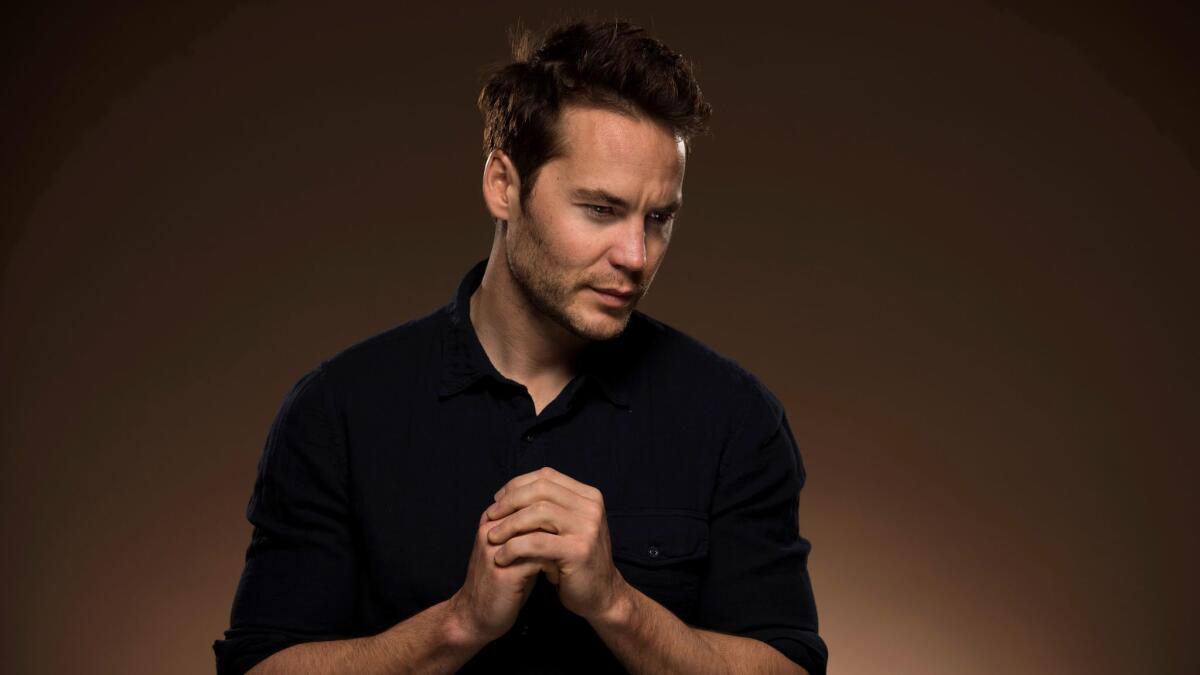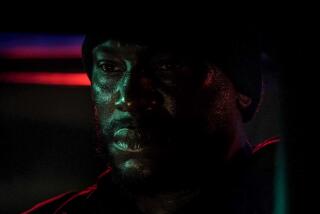‘Waco’ cast and creators aim for nuanced portrait of dark history

Before it became the location famous for the cost-effective, shabby-turned-chic homes seen on HGTV’s “Fixer Upper,” Waco, Texas, was perhaps best known for the bungled 51-day siege near the city by federal law enforcement of cult leader David Koresh’s Branch Davidian compound, which ended in tragedy in spring 1993.
A new Paramount Network six-part miniseries aims to remind viewers of — or, depending on their age, introduce them to— the harrowing standoff as the 25th anniversary nears.
“Waco” chronicles the days leading up to and the eventual storming of the apocalyptic religious sect’s homestead by federal agents. The raid culminated in a deadly fire; in the end, four federal agents and more than 70 Branch Davidian members, including 17 children under age 10, died. In the months that followed, probes into the standoff called into question the tactics and judgment of federal officials on the case.
“Friday Night Lights” alum Taylor Kitsch stars as the charismatic cult leader, while Oscar-nominated actor Michael Shannon (“The Shape of Water,” “Nocturnal Animals”) plays FBI negotiator Gary Noesner.
The miniseries, which premieres Wednesday, is a key property helping to shape the identity of the Paramount Network, a rebranding of Viacom’s male-skewing Spike channel that launched last week, as a general entertainment destination. And it underscores how television programmers are eager to get a piece of the true-crime frenzy gripping viewers.
“The story of Waco is very important, historically, and very compelling,” said Keith Cox, the network’s president of development and programming. “For us, as we rebrand ... it was the perfect piece that we think will really speak to an audience. … People love true crime. They just make for really gripping, emotional and riveting storytelling.”
(The miniseries has had its own complicated history. The Weinstein Co. was one of its producers, but the producing credits were removed in the wake of the sexual harassment and rape allegations leveled against Harvey Weinstein.)
I don’t think you’ll ever fully understand the why.
— Taylor Kitsch, who plays cult leader Darvid Koresh in “Waco”
For writers John Erick Dowdle and Drew Dowdle, whose film credits include 2015’s “No Escape” and 2010’s “Devil,” the journey to telling the story of the infamous standoff began four years ago as they were trying to flesh out a villain for an unrelated film script.
“We thought, ‘What if he grew up in a cult, like the Branch Davidians?’” John Erick recalled. That led them to a book by David Thibodeau, one of the sect’s surviving members, titled “A Place Called Waco.”
“Five pages into it,” John Erick said, “I called Drew and was, like, ‘You have to read this.’ It was totally different than what I remembered of the news accounts.” They quickly came to the realization that unpacking the true story would be more compelling than their fiction.
“We find that people over the age of 35 tend to remember a distorted version of what really happened, the media narrative of the time,” Drew said. “And people under the age of 35 largely don’t know about it at all, or they’ve heard it loosely referenced. It was a story that was running the risk of being permanently erased in the history books in a distorted, untrue version. And to some extent, we wanted to tell a more balanced version of it.”
The brothers knew they wanted to go beyond the news reports, because in their view, one of the major failures of the media was its distance from the action.
The duo interviewed agents from the Bureau of Alcohol, Tobacco and Firearms and the FBI, as well as theologians, lawyers and surviving Branch Davidian members in an attempt to offer both an inside view of what unfolded and multiple perspectives of the entities that battled it out over the nearly two-month ordeal. The pair also relied on “Stalling for Time: My Life as an FBI Hostage Negotiator,” a book written by Noesner, for insight into the perspective of authorities. Both Thibodeau and Noesner served as consultants on the miniseries.
It was a story that was running the risk of being permanently erased in the history books in a distorted, untrue version of it...
— Drew Dowdle
The Dowdles’ goal was to present a “no bad guys” account that would challenge the preconceptions of viewers.
“What we’re saying is there’s not one right side — it’s not the FBI or the ATF or the Branch Davidians who are the bad guys,” Drew said. “All three of those entities had complicated situations. It led to some very poor decisions, for sure.”
“We wanted to see why people do the things they do,” added John Erick.
For Kitsch, that meant not making a judgment call on whether Koresh was a stone-cold psychopath or a disturbed man with a troubled childhood in search of purpose.
“You didn’t know what you were getting,” Kitsch said. “That was fun to play, because I could turn a whole scene around if I wanted to, and it would be justifiable, because that guy wore his heart on his sleeve and was very emotional and manipulative. He was incredibly loving at times, and then at times just no bueno [not good] … I don’t think you’ll ever fully understand the why.”
The actor, whose other credits include HBO’s “True Detective” and “Lone Survivor,” says he immersed himself in all things Koresh in the four months he had to prepare for the role, poring over hundreds of hours of video and recruiting tapes, as well as peppering Thibodeau with questions. In addition to shedding 30 pounds, Kitsch took guitar and singing lessons — Koresh was a skilled musician who led a band made up of his followers — and studied the Bible.
I think it was a huge event in American history. But if you don’t know it, you’re going to find yourself getting on the computer and Googling.
— Keith Cox, the president of development and programming at the Paramount Network
Shannon, who relied heavily on Noesner’s book and discussions with the since-retired FBI agent, chose not to try an impersonation, since it was futile — the men are very different physically, he said, “I don’t think anyone would ever mistake me for Gary Noesner.” Instead, his focus was trying to capture how Noesner’s mind ticked, the way he approached his work and the different emotions that resulted from the stressful situations in which he operated.
“It wasn’t easy what Gary had to do — that’s an understatement,” said Shannon, currently appearing in the staging of Brett Neveu’s “Traitor” in Chicago. “The challenge of negotiating with David was big enough on its own. But Gary was getting thwarted and second-guessed by his own co-workers, which made it doubly difficult. … I was completely fascinated by that.”
In attempting to create a mutlidimensional portrait of all the players, the brothers have been criticized by those who believe they underplay the allegations of child abuse, including statutory rape, made against Koresh and the sect’s members.
The Dowdles acknowledge that they don’t spend a lot of time exploring the topic, in part because it was “tricky” — while they believe that Koresh, who operated with an Old Testament mind-set, was guilty of statutory rape, they felt that other reports of physical abuse were overblown or inconclusive.
The Waco standoff has been the subject of various film and TV projects through the years but has resurfaced in recent months with the approach of the 25th anniversary. Koresh was one of the many leaders Evan Peters portrayed in the cult-focused season of “American Horror Story” that wrapped its run in November. And it has prompted a number of specials, including the upcoming A&E documentary “Waco: Madman or Messiah.”
Cox said viewers too young to remember the events — Kitsch, for example, was 11— or not yet born, will still be intrigued.
”It was a huge event in American history,” he said. “But if you don’t know it, you’re going to find yourself getting on the computer and Googling.’
The last installment will be shown on Feb. 28, the 25th anniversary of the start of the siege. With more than two decades of hindsight, what is the legacy of the deadly tragedy?
“I think it’s a pretty terrible one,” Kitsch said. “It’s something that people can’t forget about, but want to kind of just sweep it under the rug. … What I’ve taken away is: Don’t be so quick to just formulate an opinion on, like, a headline or something — know the source, know where it’s coming from.”
The most-read Entertainment stories this hour »
‘Waco’
Where: Paramount and CMT
When: 10 p.m. Wednesday
Rating: TV-14 (may be unsuitable for children under the age of 14)
Twitter: @villarrealy
More to Read
The complete guide to home viewing
Get Screen Gab for everything about the TV shows and streaming movies everyone’s talking about.
You may occasionally receive promotional content from the Los Angeles Times.







